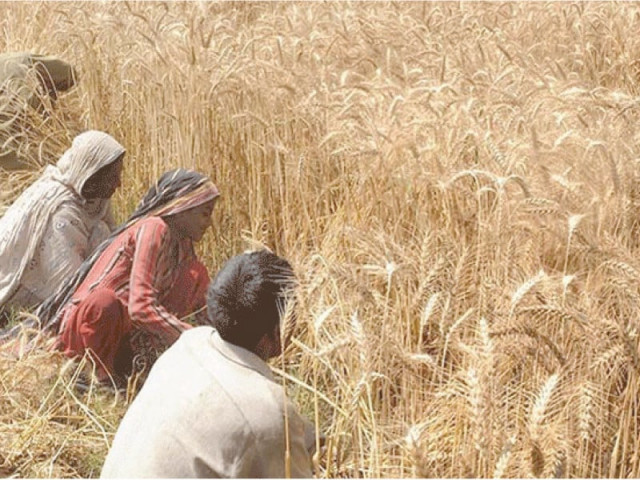ECC okays 69% less wheat purchase
Allows borrowing of Rs275b for procurement; no target set for Punjab

The federal government on Friday fixed the wheat procurement target at 2.5 million metric tons, which was 69% lower over the current year’s target due to the absence of Punjab from the campaign, and allowed loans of Rs275 billion for purchase of the commodity.
The Economic Coordination Committee (ECC) of the cabinet approved wheat procurement targets for Pakistan Agricultural Storage and Services Corporation (Passco), Sindh and Balochistan. Punjab did not share its financing requirement and wheat procurement plan.
Procurement targets and support prices are approved by the provincial cabinets but they need the permission of the centre for taking loans.
The ECC authorised the issuance of Rs275 billion in loans to enable them to procure 2.45 million tons of wheat.
While compromising transparency for the consecutive second day, the finance ministry did not issue a press statement after the ECC meeting. A day earlier, the ECC, headed by Finance Minister Muhammad Aurangzeb, approved Rs24 billion in supplementary grants.
The finance ministry’s move to keep ECC’s decisions under the carpet is contrary to the finance minister’s own policy of media outreach.
The new procurement target of 2.45 million tons is 69%, or 5.4 million tons, less than the current year. Key reasons behind setting a low target was the absence of Punjab and the wheat surplus.
As against last year’s target of 4.5 million tons, the ECC did not fix any target for Punjab. A finance ministry official said that the Punjab government had not yet responded to the request to communicate its procurement target and financing needs.
If the Punjab government decides not to lift at least 4 million tons of wheat, farmers will be at the mercy of middlemen and may not get the minimum price of Rs3,900 per 40 kg. The World Bank has long been urging the provincial government to limit its wheat procurement to 2 million tons to avoid huge budgetary implications.
The Punjab government has approved the wheat procurement policy 2024-25 under which its cabinet fixed the minimum support price at Rs3,900 per 40 kg for the year 2023-24, which was unchanged from last year.
Read National wheat cultivation record shattered
Punjab’s representative informed the ECC that the provincial government was in the process of retiring the previous loans taken for wheat procurement. The representative said that the province would buy the commodity, as and when required.
The federal food ministry has expressed apprehension that the new 2.45-million-ton procurement target would be insufficient despite carry-forward stocks of 3.3 million tons from last year, according to sources.
The Express Tribune contacted Punjab Food Minister Bilal Yasin but he was not available for comments.
Some ECC members were of the view that the federal government should not interfere in setting targets. However, the provinces need to borrow from banks for purchasing the commodity, which is not possible without involvement of the finance ministry.
The ECC fixed Sindh’s wheat purchase target at 1 million tons, down 28% from last year, and authorised the provincial government to get a loan of Rs100 billion.
Sindh will buy the commodity from farmers at Rs4,000 per 40 kg. It owes commercial banks Rs77 billion on account of commodity operations.
In December, the federal government decided to keep the wheat support price unchanged at Rs3,900, but governments of Sindh and Balochistan refused to accept the decision.
The federal minister for national food security expressed reservations about the unilateral decisions made by the two provinces, which created distortion in the market.
Three different wheat support prices may destabilise the commodity market, according to food ministry officials.
The ECC approved a procurement target of 50,000 metric tons for Balochistan and sanctioned a borrowing limit of Rs5.7 billion for the provincial government. The province’s cash limit of Rs5.7 billion was determined on the basis of a wheat price of Rs4,300 per 40 kg.
The maximum target of 1.4 million metric tons was approved for the federal government-owned Passco, which was 400,000 tons, or 22%, less than last year.
The ECC approved Rs169 billion in cash credit limit for Passco, whose target was set on the basis of a price of Rs3,900 per 40 kg. Passco already owes Rs386 billion to banks on account of loans taken during previous years.
Pakistan is expected to have a surplus wheat harvest this year. Against the target of 22.2 million acres, the commodity was sown over an area of 23.7 million acres.
The country already has stocks of 4.7 million tons. Punjab has 2.3 million tons in storages, followed by 1.3 million tons with Passco. Sindh carries a stock of 510,000 tons. The private sector has imported 320,000 metric tons.
At the time of arrival of the new crop, the country would be left with stocks of 3.3 million tons, which could meet its needs without any additional imports, the food ministry told the ECC. The crackdown on the smuggling of wheat has helped maintain sufficient buffers.
The government expects wheat production of 28 million to 29 million metric tons this year. It will have total reserves of 32 million tons, meaning there will be no need for import.
The expected production of 29 million tons is 3 million tons less than the forecast. Punjab is expected to have a harvest of 22.3 million tons against the target of 25 million tons.
Sindh will exceed its 4-million-ton production target. Khyber-Pakhtunkhwa’s production of 1.4 million tons is expected to remain below the target by 200,000 tons.
Published in The Express Tribune, April 6th, 2024.
Like Business on Facebook, follow @TribuneBiz on Twitter to stay informed and join in the conversation.


















COMMENTS
Comments are moderated and generally will be posted if they are on-topic and not abusive.
For more information, please see our Comments FAQ